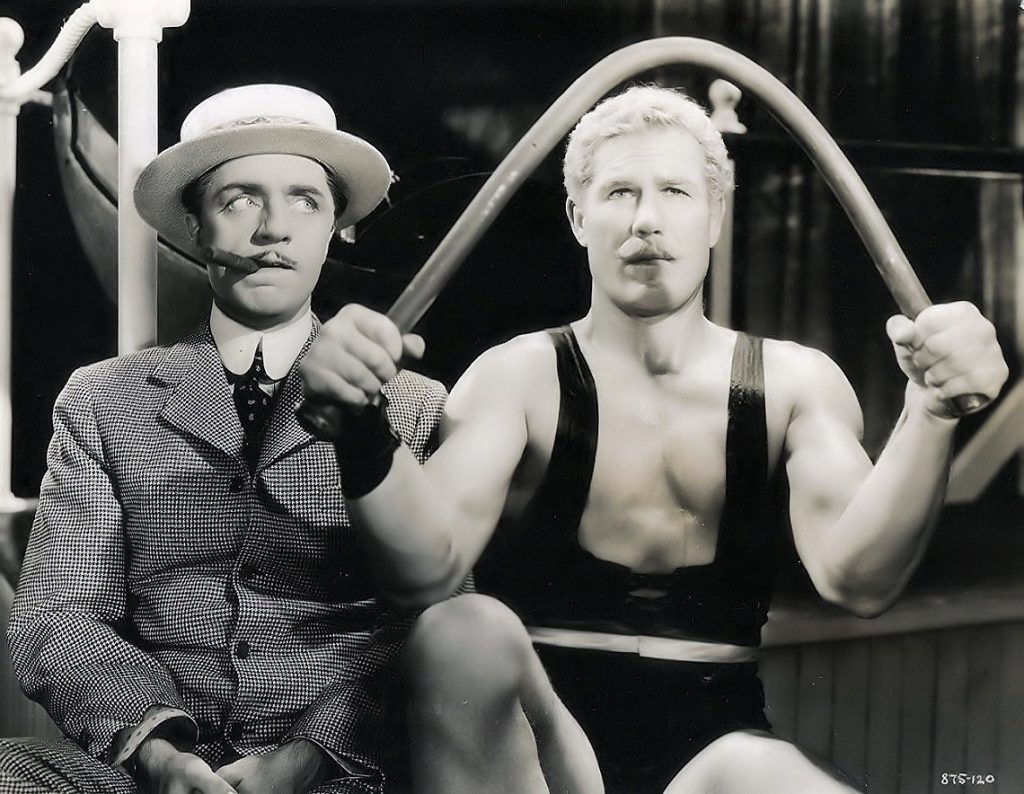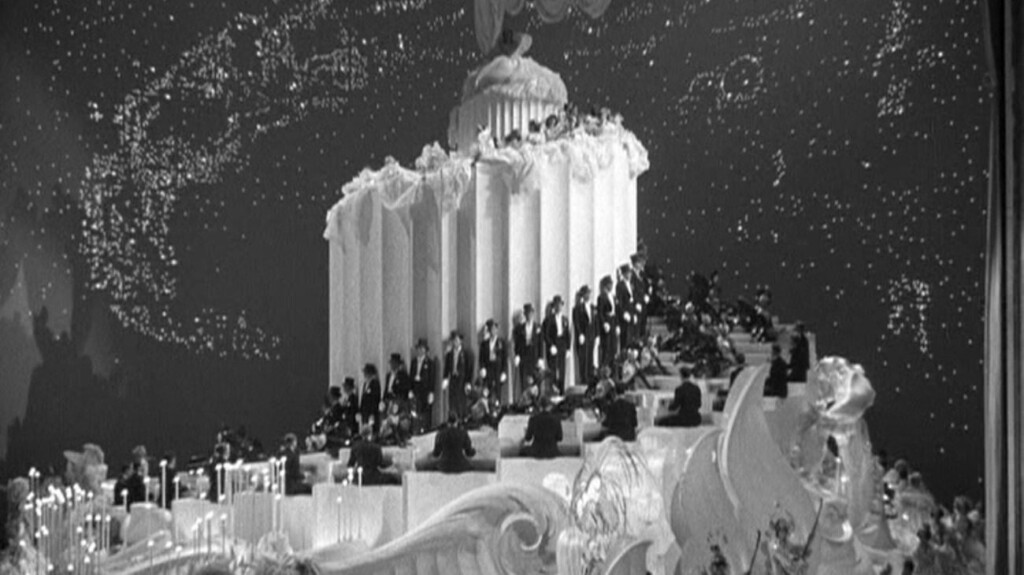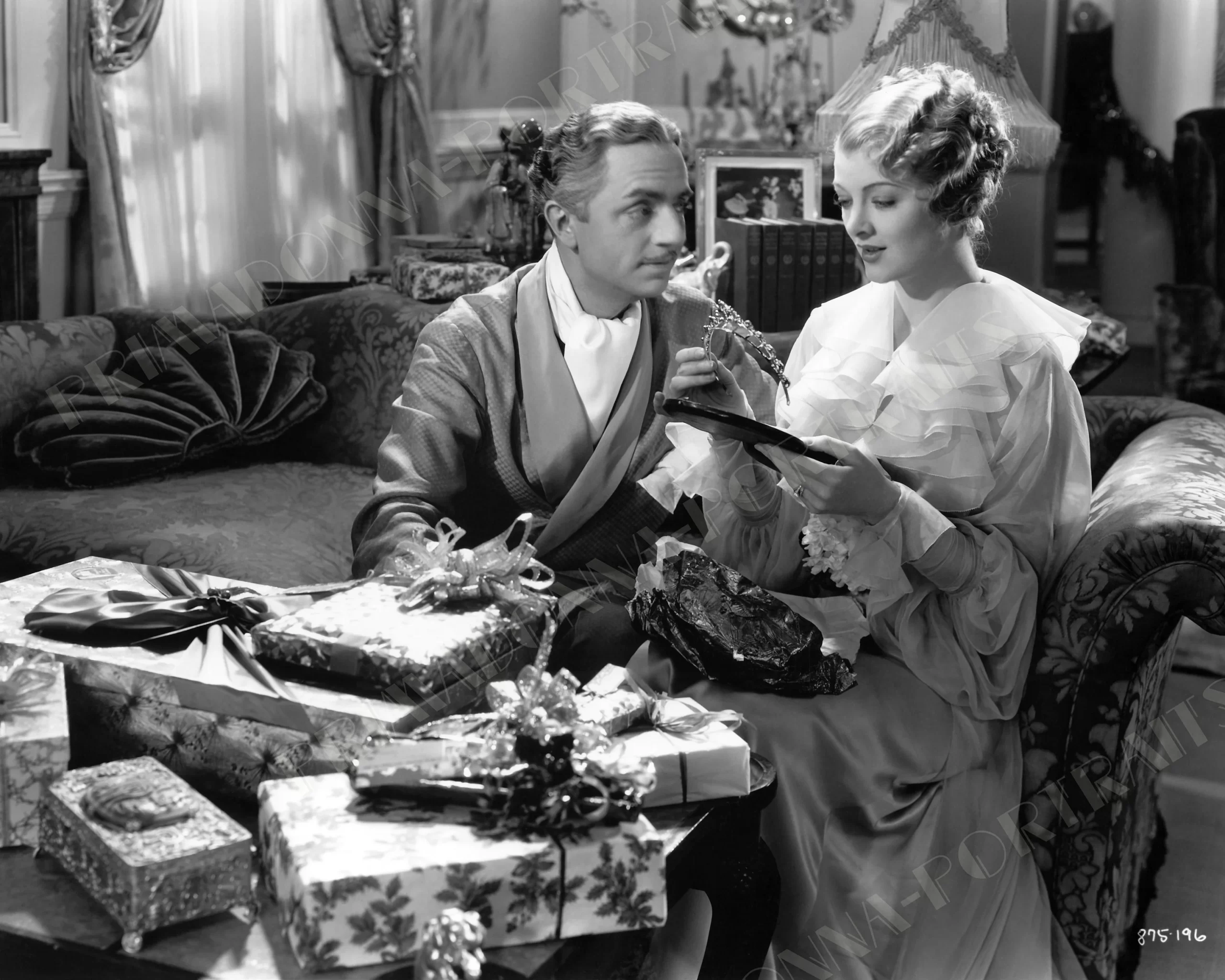The Other Nominees: Anthony Adverse; Dodsworth; Libeled Lady; Mr. Deeds Goes to Town; Romeo and Juliet; San Francisco; The Story of Louis Pasteur; A Tale of Two Cities
That’s right, this column is still (technically) going. I figured in honor of the Academy Awards, I should revive this long-dormant series and tackle the reason I put it on hold in the first place: The Great Ziegfeld. It’s not that this movie is particularly hard to find – it’s streaming on HBO right now, and readily available on Amazon Prime Video – it’s just after liking Mutiny on the Bounty as much as I did, I didn’t feel like tackling a three-hour musical. Anyway, I’m not here to make excuses, I’m here to talk about The Great Ziegfeld, which is actually far more enjoyable than “three-hour musical” makes it sound.
We first meet Florenz Ziegfeld Jr. as a carnival barker. He’s trying to lure people into this strongman show, but loses all his potential customers to the revue across the way, a troupe of faux-Egyptian dancers. That show’s manager, Jack Billings, heckles Ziegfeld: “How’s business, Ziggy?” One of the pleasures of The Great Ziegfeld is watching this friendly rivalry blossom into a lifelong friendship, and there’s a great running gag involving Ziegfeld continually turning to Billings for money. Billings at first balks, and then eventually gives in, knowing Ziegfeld will spend it as soon as he gets it. We buy this because Ziegfeld is played by William Powell at maximum charm. Powell is probably too old to be playing Ziegfeld at the film’s outset, but as the character ages Powell is able to embody him with greater ease. The character rarely moves beyond wry archness, but Powell is able to coast on his considerable charisma. He gives Ziegfeld some funny idiosyncrasies, too, such as his fixation on making stairs higher and higher, or his insistence on sending a telegram to someone who might be just down the midway.

It’s clear that this movie is the ur-text for similar fawning biopics like The Greatest Showman; Ziegfeld seems so unwilling to show its title character in a negative light that it borders at times on hagiography. (This could also be due to the fact that the real Ziegfeld died only four years prior to this coming out.) We see Ziegfeld steal ideas and performers, most often from Billings, and not only does the movie not condemn him for it, it actively rewards him for it. Billings is a fine foil for Ziegfeld, but he’s not enough of a character to stand up for himself more than once or twice in this very long movie. A lot of The Great Ziegfeld coasts on charm, though, and Frank Morgan’s affable turn as Billings is no exception (you probably know Morgan as the guy who didn’t want to let anyone see the wizard in The Wizard of Oz).
About that runtime: why is this movie so damn long? It becomes evident pretty early on. With the real Ziegfeld dead and his titular Follies no longer dominating Broadway, your average American in 1936 had no way or chance of seeing the real thing, so The Great Ziegfeld approximates them as best as it can. This works very well – once. There’s an early number called “A Pretty Girl is Like a Melody” that is a genuine showstopper. In two seamlessly edited shots, we see the number in its entirety, and the spectacle is lush and sumptuous in the way of great period pieces. The columnal set rotates in the center of the stage, revealing string players, singers, men in tuxedoes, all manner of grandeur and wonderments. It’s here that Ziegfeld really shows what makes its main character “great”; the problem is that the movie does this three more times. Once you realize this, you can just ride that fast-forward, because a lot of the tunes are hopelessly dated, and one, a soft-shoe rendition of Eddie Cantor’s “If You Knew Susie,” is in blackface for no discernible reason. Skipping these scenes will, no joke, take an hour off of the runtime. Calling The Great Ziegfeld a musical is a bit misleading; none of the characters break into song, but there is a glut of singing and dancing, only some of which affects the actual plot of the film.

The quality of the performances varies across the board. Powell is great, and Morgan does fine work with what little he’s given to work with. As Ziegfeld’s first wife, French singer Anna Held, Luise Rainer (who somehow won an Oscar for this) is pretty inconsistent. She’s never more than one misread cue or mistaken inference away from devolving into total hysteria, and as a result the longer her scenes go, the more annoying they tend to be. She has a fine voice, but the songs she sings are unbearably campy to a modern viewer. Hollywood’s regard for the real Ziegfeld is evident, too; not only does he merit this fawning biopic, but a game Fannie Brice shows up, playing herself, and is willing to let herself be the butt of jokes about her looks. She acquits herself nicely, and seems to be having a ball in her scenes opposite Powell. Apparently Ray Bolger also plays himself in this, but I’ll be damned if I saw him on screen.
One of the most notable facts of The Great Ziegfeld is that it reunites Powell with his costar from The Thin Man, Myrna Loy (in total, Powell and Loy made fourteen films together). Loy is second-billed in spite of the fact that she appears 135 minutes into a 180-minute movie, but it becomes clear why she was afforded such high billing. She and Powell are absolute dynamite together, and it’s in their scenes (Loy plays Billie Burke, Ziegfeld’s second wife) that the movie really comes alive, allowing Powell, in the comforting presence of his longtime screen partner, to plumb the depths of Ziegfeld as a person and not just a character in a movie. Their scenes together fairly crackle, and make for a more interesting look at Ziegfeld than the rest of the movie.
It’s not without its pathos, though. Sure, there are times – particularly in Anna’s scenes – where the movie veers off course and crashes straight into melodrama, which is basically unavoidable when taking an uncritical approach to your main character. It’s still striking, though, to see Ziegfeld brought low without a chance of bouncing back, as he has so many times before. He’s in a small apartment, looking out a window at a theater bearing his name, planning for a comeback that will never come to pass.
It’s hard to unreservedly recommend The Great Ziegfeld the way I would, say, It Happened One Night or Mutiny on the Bounty, because, well, it’s three hours long with copious amounts of singing and dancing that drag the narrative behind it. There are 94 Best Picture winners, and some are designated tourist stops; unless you’re watching every winner, there’s no reason to look into Cavalcade or The Broadway Melody. The Great Ziegfeld is better than both of those, and with a heavier hand in the editing bay it might get a full-throated recommendation. It’s worth your time, just keep your remote handy with your thumb on fast-forward.
Previously: Mutiny on the Bounty
Next Up: The Life of Emile Zola

